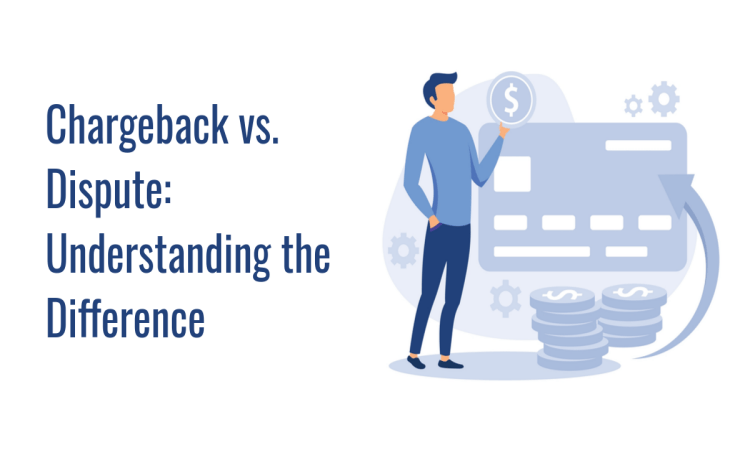When customers are not satisfied with a purchase and want their money back, they have two options. One is to request a refund, and the other is to initiate a chargeback.
A refund request is settled directly between the customer and the merchant. A chargeback, on the other hand, involves several parties and is more time-consuming and costly for the merchant.
The problem with chargebacks is that it is often unclear what this procedure entails. Furthermore, the term itself is often used interchangeably with the word dispute.
The ambiguous usage of the words chargeback and dispute can cause misunderstandings. To clarify the issue, we examine the differences between the two terms.
Note: For more on the differences between a refund and a chargeback, refer to our article Chargeback vs. Refund: Differences and How to Handle Them.
Chargebacks vs. Dispute: Definitions and Differences
The term chargeback generally refers to the chargeback procedure as a whole, while a dispute refers to a specific action or phase within the chargeback procedure.
Confusion arises because dispute is used to refer to two different actions initiated by two different parties (the customer and the merchant). To make matters worse, some use the terms dispute and chargeback interchangeably. For example, institutions in the Visa network use the word dispute to refer to the whole chargeback process. Finally, some use the compound term chargeback dispute.
Let's look into the chargeback procedure to understand how disputes fit in the process.
The Chargeback Procedure
A chargeback procedure involves at least 3 parties:
- The customer
- The merchant
- The card-issuing bank
The process consists of the following phases:
- The customer initiates a dispute by making a request to their bank to reverse a transaction.
- The bank checks if the dispute is valid and looks at the evidence presented by the customer. Some banks notify merchants when a dispute is initiated.
- The bank transfers funds from the merchant's account to the customer's card, possibly charging the merchant additional chargeback fees.
- Some merchants dispute the chargeback, presenting evidence that refutes the validity of the chargeback. This is also called representment.
- The card issuing bank reviews the new evidence and reaches a final decision. If the chargeback is overturned, the funds are returned to the merchant's account.
To summarize, the issue of chargeback vs. dispute is one of inconsistent use of terminology. Each bank or payment service prefers one term over the other, thus causing ambiguity.
Note: Learn also about retrieval requests and how they compare to chargebacks.
Why Do Disputes Happen?

There are three main reasons why customers initiate disputes.
1. The Customer Does Not Recognize the Charge
Most disputes stem from charges the customer fails to recognize. They may have been conducted by other authorized users (i.e., family members), or the customer may have forgotten about a recurring charge (e.g., a subscription fee for a service). A mismatch between the name of the merchant and what is printed on the billing descriptor can also cause this kind of problem.
2. The Customer is a Victim of Fraud
In some cases, the customer is the victim of credit card fraud. When this occurs, the merchant has little choice but to accept the chargeback. This is a frequent cause for chargeback requests.
3. The Customer is Unsatisfied with a Purchase
Some disputes begin when a customer thinks they did not get what they paid for. Lost or damaged products are commonly cited as a reason, but this usually merits a refund, not a chargeback. However, if the refund request fails for whatever reason, the customers can initiate a chargeback procedure.
How to Deal with Disputes as a Merchant?
When customers file a chargeback request, the bank may send the merchant an inquiry and postpone returning the funds to the customer for a while. This gives the merchant a chance to provide evidence to support their claim that the charge was legitimate.
Merchants are advised to respond to these inquiries as soon as possible. Failing to do so will cause the bank to proceed with the chargeback. The bank will also issue chargeback fees or penalize the merchant in other ways.
Note: Banks and card issuing companies closely monitor the number of chargeback requests a merchant receives. To avoid a high chargeback rate and being labeled a high-risk merchant, read our article What is a Chargeback Rate and How to Calculate It.
How to Fight a Chargeback as a Merchant?
If a merchant decides to fight a chargeback, they can do so via representment. This is the act of presenting evidence to confirm that the initial charge was valid. The card issuing bank reviews the new evidence, and compares it with the evidence provided by the customer.
If the bank does not settle the issue with the merchant, the chargeback procedure moves into the pre-arbitration phase. During pre-arbitration the two banks - the card issuing bank (customer's bank) and the acquiring bank (the merchant's bank) - get one more opportunity to settle the matter. At this point, the merchant has the chance to accept liability for the chargeback. If they refuse to, the process moves on to the final stage: arbitration.
During arbitration, the card network becomes involved. They review the evidence and reach a final decision. Whichever party loses the arbitration has to pay additional chargeback fees.
Conclusion
As you can see, the problem between the terms chargeback and dispute is one of inconsistent and ambiguous use by different stakeholders. Both terms are often used in the same context, and some organizations prefer using one over the other.
It is important to remember that while some form of dispute is unavoidable when running a business, chargebacks are costly and affect a merchant's reputation. As a merchant, do what you can to avoid them by implementing robust anti-fraud solutions and performing due diligence to ensure customer satisfaction.
